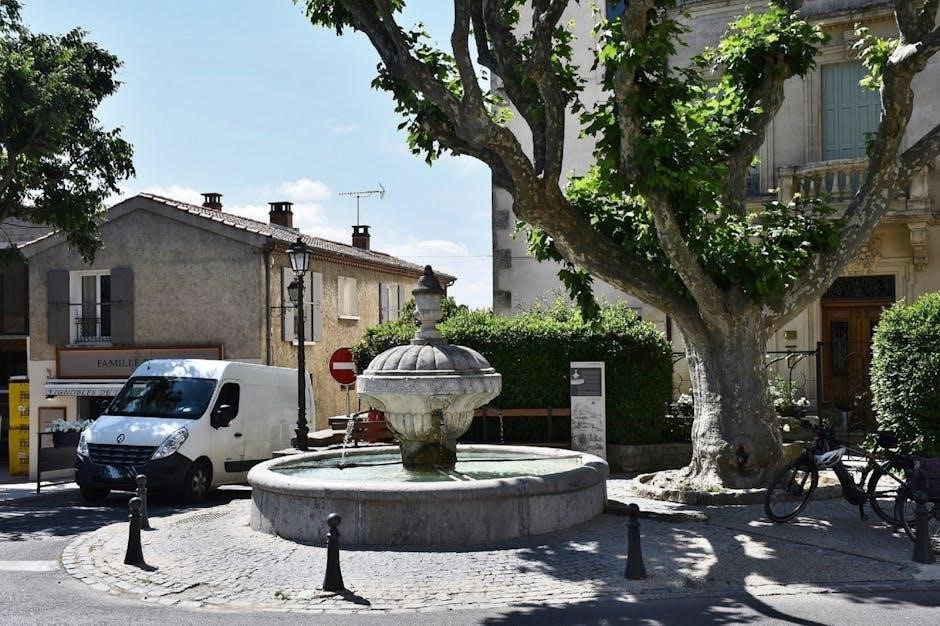Daphne du Maurier’s Rebecca is a timeless Gothic romance published in 1938, exploring themes of identity, jealousy, and class. The novel follows a young bride competing with the legacy of her husband’s deceased wife, Rebecca, at Manderley. Widely acclaimed, it remains a classic in literature, with its PDF version easily accessible for modern readers.
Overview of the Novel
Rebecca by Daphne du Maurier is a Gothic romance and psychological thriller published in 1938. It follows a young woman who marries Maxim de Winter, a wealthy widower, and returns to his estate, Manderley, where the memory of his late wife, Rebecca, dominates. The novel explores themes of identity, jealousy, and class, captivating readers with its atmospheric and suspenseful narrative. The PDF version remains widely popular, offering easy access to this timeless classic.
Significance of the PDF Version
The PDF version of Rebecca by Daphne du Maurier has made the classic novel accessible to a modern audience. It preserves the original text’s integrity while offering a convenient reading format. Easily downloadable, the PDF allows readers to explore the haunting tale of love, jealousy, and mystery on various devices, ensuring the story’s enduring legacy in digital form.

Plot Summary
Rebecca by Daphne du Maurier tells the story of a young woman who marries Maxim de Winter and returns to his estate, Manderley, haunted by his late wife, Rebecca.
The Storyline
The novel follows a young, unnamed protagonist who marries the wealthy Maxim de Winter and returns to his estate, Manderley. Haunted by the memory of Maxim’s late wife, Rebecca, the new Mrs. de Winter struggles to find her place. Rebecca’s mysterious death and lingering presence dominate the narrative, creating an oppressive atmosphere. As secrets unfold, the protagonist discovers the truth about Rebecca and her husband, leading to a climactic revelation and personal transformation.
Key Plot Elements
The novel’s key plot elements include the mysterious death of Rebecca, the oppressive presence of her memory at Manderley, and the psychological tension between the new Mrs. de Winter and the housekeeper, Mrs. Danvers. Maxim’s hidden past and the eventual revelation of Rebecca’s true nature drive the story toward its dramatic conclusion, exploring themes of love, jealousy, and deception.
Major Themes
The novel masterfully explores themes of identity, jealousy, and class, delving into psychological tension and the haunting, oppressive presence of the past through its intricate narrative.
Identity and Belonging
The second Mrs. de Winter grapples with her identity, overshadowed by Rebecca’s enigmatic presence. Her struggle to belong at Manderley reflects the tension between her humble origins and the aristocratic world she enters. The novel highlights her journey of self-discovery, as she navigates the expectations of her new role and the lingering influence of her predecessor, seeking to carve her own place in the grand estate.

Jealousy and Obsession
Jealousy permeates Rebecca as the second Mrs. de Winter obsesses over her husband’s deceased wife. Rebecca’s lingering presence fuels her insecurities, while Maxim’s guarded nature intensifies her suspicions. The novel masterfully portrays how obsession with the past can destroy relationships and identities, creating a toxic dynamic that drives the plot toward its tragic revelation and resolution.
Class and Social Status
In Rebecca, class and social status are central themes, shaping the characters’ identities and relationships. The second Mrs. de Winter struggles to navigate the aristocratic world of Manderley, contrasting her humble origins with Maxim’s privileged upbringing. The novel critiques the rigid social hierarchy of the time, highlighting the pressures of maintaining status and the tension between old money and new beginnings. Manderley itself symbolizes the enduring power of class and tradition.

Character Analysis
The novel explores complex characters like the second Mrs. de Winter, Maxim, and Rebecca, delving into their psychological depths and interpersonal dynamics, shaping the story’s tension.
The Second Mrs. de Winter
The second Mrs. de Winter, unnamed throughout the novel, is a shy and inexperienced young woman who marries Maxim de Winter. She struggles to find her place at Manderley, overshadowed by Rebecca’s memory. Her journey is one of self-discovery, as she navigates the complexities of her marriage and the haunting legacy of her predecessor. Her character evolves from insecurity to resilience.
Maxim de Winter
Maxim de Winter, a wealthy and enigmatic aristocrat, is haunted by the death of his first wife, Rebecca. His marriage to the second Mrs. de Winter is marked by tension and secrets. A complex character, Maxim is both charming and tormented, struggling with the legacy of Rebecca and the truth about her tragic end. His relationship with the new Mrs. de Winter reveals his inner turmoil and the dark mysteries of Manderley.
Rebecca
Rebecca, Maxim de Winter’s first wife, is a central figure in the novel, despite her death before the story begins. Her charismatic and mysterious presence dominates Manderley, the de Winter estate, and haunts the second Mrs. de Winter. Rebecca’s beauty, charm, and reckless nature are contrasted with her manipulative and destructive tendencies. Her tragic death and the secrets surrounding it drive the plot, revealing a complex and troubled character whose legacy endures long after her passing.
Historical Context
Written in 1938, Rebecca reflects the suspenseful atmosphere of pre-WWII England, drawing from du Maurier’s life and the gothic tradition popular at the time.
Publication and Reception

Rebecca was first published in 1938, becoming an instant bestseller. Its gothic suspense captivated readers, and the 1940 Hitchcock film adaptation further boosted its popularity; Initially receiving mixed reviews, it is now celebrated as a classic of 20th-century literature. The novel’s enduring appeal lies in its psychological depth and atmospheric storytelling. The PDF version remains widely accessible, ensuring its reach to modern readers worldwide.
Biographical Influences
Daphne du Maurier’s personal life heavily influenced Rebecca. Her marriage to Frederick Browning, a military officer, and her feelings of inadequacy alongside his first wife’s legacy shaped the novel’s themes. Her French ancestry and fascination with aristocratic tales also inspired Manderley’s atmospheric setting. These biographical elements enriched the story, blending personal experiences with fictional drama to create a timeless classic.
Adaptations and Legacy
Rebecca has been adapted into films, including a 1940 Oscar-winning version by Alfred Hitchcock. Its lasting impact on literature and popular culture remains profound, as seen in its numerous reprints and digital versions like the PDF format, ensuring its accessibility to new generations of readers.
Film Adaptations
Daphne du Maurier’s Rebecca has been adapted into several films, most notably the 1940 version directed by Alfred Hitchcock, starring Laurence Olivier and Joan Fontaine. This adaptation won the Academy Award for Best Picture, cementing the novel’s place in cinematic history. In 2020, a new adaptation was released on Netflix, featuring Lily James and Armie Hammer, introducing the story to a modern audience while staying true to its gothic essence.
Impact on Popular Culture
Rebecca has left a lasting impact on popular culture, inspiring numerous references in literature, film, and music. Its iconic characters and themes of jealousy and identity continue to influence modern storytelling. The novel’s gothic atmosphere has also inspired fashion and art, particularly in the dark academia aesthetic. Its enduring popularity is evident in its adaptation into various forms of media, solidifying its place as a cultural touchstone.

Reading Guide
Explore Daphne du Maurier’s Rebecca with guides offering insights into themes, characters, and atmospheric settings. PDF resources and study materials enhance understanding for readers of all levels.
Approaching the Text
When reading Rebecca, focus on the narrator’s psychological journey and the eerie atmosphere of Manderley. Pay attention to symbolic elements like the house and Rebecca’s presence. Analyze the power dynamics between characters, particularly Maxim and the second Mrs. de Winter. The PDF version offers a convenient format for highlighting key passages and themes, aiding deeper analysis of du Maurier’s masterful storytelling.
Analysis Tips
When analyzing Rebecca, focus on the narrator’s perspective and her psychological state. Examine the atmospheric descriptions of Manderley and its symbolic role. Compare the two Mrs. de Winters to understand themes of identity and jealousy. Pay attention to foreshadowing and dialogue for clues about Rebecca’s fate. Consider the societal context of class and gender roles. Use the PDF version to highlight and annotate key passages for deeper insight.
Daphne du Maurier’s Rebecca remains a timeless classic, its themes of identity and jealousy captivating readers. The PDF version ensures its accessibility, allowing new generations to experience the haunting tale of Manderley and its secrets.
Final Thoughts
Daphne du Maurier’s Rebecca captivates with its haunting exploration of love, jealousy, and identity. The PDF version ensures easy access, making this Gothic masterpiece a must-read for fans of psychological fiction and classic literature.
Recommendation
Rebecca by Daphne du Maurier is a must-read for fans of Gothic fiction and psychological drama. Its intricate plot and vivid characters make it a compelling choice. The PDF version is readily available, offering an accessible way to experience this timeless classic. Readers seeking a story filled with suspense and emotional depth will find Rebecca endlessly engaging and unforgettable.



